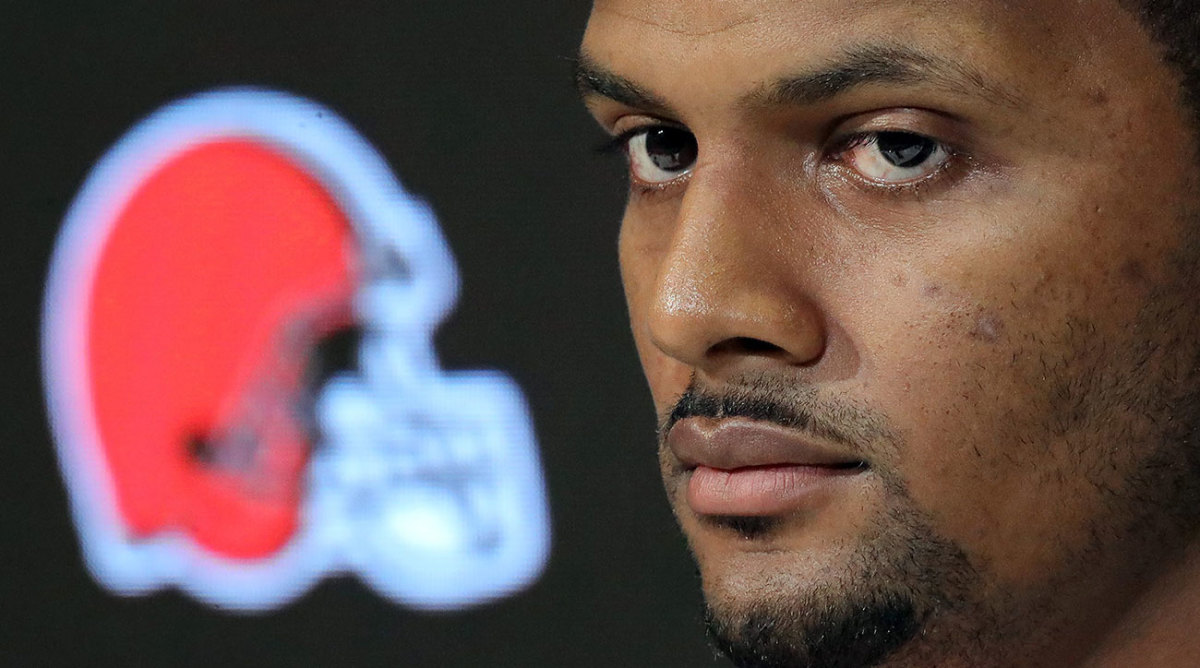Inside the Deshaun Watson Ruling: Suspension, Last-Minute Settlement Talks, Next Steps
There’s a passage in Sue L. Robinson’s 15-page decision on Browns quarterback Deshaun Watson that cuts to the heart of how she felt the NFL wanted the disciplinary process to go. It’s one that can also illuminate where things go next.
“The NFL may be a ‘forward-facing’ organization, but it is not necessarily a forward-looking one,” she wrote. “Just as the NFL responded to violent conduct after a public outcry, so it seems the NFL is responding to yet another public outcry about Mr. Watson’s conduct. At least in the former situation, the Policy was changed and applied proactively. Here, the NFL is attempting to impose a more dramatic shift in its culture without the benefit of fair notice to—and consistency of consequence for—those in the NFL subject to the Policy.”
The previous case Robinson is referencing in that passage is Ray Rice’s. You likely remember how that one went. The league initially suspended Rice in July 2014 for two games. There was, to use Robinson’s term, public outcry over the leniency in such a serious case. The video of him assaulting his then fiancé came out that September, bringing a visual to just how serious a case it was. The NFL changed its policy on domestic violence in the aftermath of the video becoming public.
That’s important because, even as the league was scolded by the arbitrator it jointly appointed with the union for worrying too much about what people on the outside think, there’s no way public opinion won’t be a major factor as the NFL takes its 72 hours to decide whether it should appeal Robinson’s decision to suspend Watson for six games, and whether it should be Roger Goodell or a designee appointed by him hearing the appeal.
This might seem simple—six games isn’t close to the year-long suspension the NFL wanted, and so it makes sense the league would exercise its power and overturn Robinson’s sanctions.
But there’s a lot more to the position that the league finds itself in.

Let’s walk through how we got here. Initial settlement talks broke down at the league’s insistence on a suspension of at least a year ahead of the late June hearing before Robinson. Then, at the hearing, the NFL brought the cases of five massage therapists forward—even though 24 had sued and Watson had, reportedly, reached out to 66 over a 17-month span. Robinson disallowed one of the five cases because the league hadn’t spoken with the women (that case was actually based on a Sports Illustrated report), taking the number down to four.
In the hearing, the league’s position was to make the case against Watson. The union’s place was to argue precedent and proportionality, and Watson’s lawyer, Rusty Hardin, was there to defend his client. The hearing ended, and Robinson, according to sources, advised the parties she’d likely decide during the first week of August, which held true.
So why create a five-week lag? First, as a former U.S. district court judge, the charge for her was to make a decision and write in a way that would be appeal-proof, and that takes time. Second, she created a new window for the sides to take another swing at reaching a settlement.
And the sides quietly did take that swing. The league made an offer, I’m told, of a 12-game suspension with a fine close to $10 million. Watson’s side, conversely, was willing to discuss a shorter suspension (of around six to eight games). In the end, the league, union and Watson’s camp never came close to a resolution, which left Robinson to rule.
Now that she has, all of this lands at the feet of the league and Goodell (and it’s not like they’re separate entities, even if the way the policy is written makes it seem that way).
The league has until Thursday morning to appeal Robinson’s ruling. If it does, then Goodell or his designee will hear the appeal and rule thereafter. Which is where we can, again, circle back to importance of public perception and how the league’s actions are received with a suspension that, for now, has Robinson’s stamp on it but not the NFL’s.
One scenario would be that the NFL could step aside. It already presented its case, and the facts of the case won’t change on appeal. Those are that, after hearing the four cases the NFL brought forward, Robinson found Watson was in violation of the personal conduct policy in three areas—sexual assault (defined by Robinson as unwanted sexual contact), conduct that poses a danger to the safety or well-being of another person and conduct that undermines or puts at risk the integrity of the NFL.
On appeal, the NFL would not be challenging, or have the ability to add to it. The league would be challenging only Robinson’s process. So it could decline to appeal and say, “We don’t like it, but we respect the process we negotiated with the union in 2020,” a process that, by the way, was put together at the urging of some owners who wanted the league’s police force to stand down after a long string of embarrassing episodes.
Another scenario would be adding two, four or six games to the penalty. Maybe Watson would accept that, looking for closure in the cases. But at that point, it’d become the NFL’s decision, not Robinson’s—and it’s hard to say whether an eight- or 10- or 12-game suspension would be seen as the NFL doing the right thing.
The third scenario would be levying the yearlong suspension the league so aggressively let everyone know it sought. In that scenario, the NFL would likely wind up in court with Watson, and it’s possible it could even mean Watson would play in the opener, since the union would almost certainly seek a temporary restraining order to put a stay on his suspension. Yes, then the league could say it’d come down hard on Watson, but it’d also be creating a story that would hang over, in all likelihood, the whole season, from Week 1 on.
We’ll know soon enough which way the NFL is going here.
But this certainly isn’t an easy call for the folks on Park Ave. And there’s a judge in Delaware who, in her way, explained to all of us on Monday morning why.
More Deshaun Watson Coverage:
- Deshaun Watson Suspension Shows Staggering Weakness by Roger Goodell
- Watson Plaintiff: ‘I’m Not a Sex Worker. I Am a Massage Therapist.’
- Houston PD Detective Testified She Believes Watson Committed Crimes, per Report
- The Browns Will Never Live Down the Watson Trade
- What You Haven’t Heard—But Need to Know—About the Deshaun Watson Cases
- After the Browns Signed Deshaun Watson, a Blast Radius of ‘Emotions and Anger’
- When Deshaun Watson Says He ‘Never Disrespected’ a Woman, Do the Cleveland Browns Believe Him?
